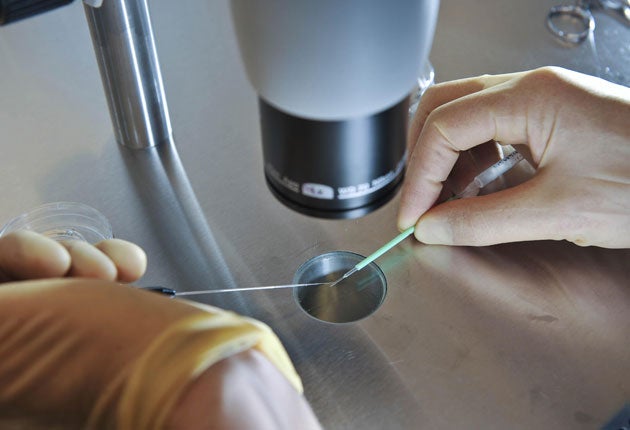Errors at fertility clinics double in just one year
Rising rate of blunders in IVF treatment 'may be systemic', says leading patient safety expert

Your support helps us to tell the story
From reproductive rights to climate change to Big Tech, The Independent is on the ground when the story is developing. Whether it's investigating the financials of Elon Musk's pro-Trump PAC or producing our latest documentary, 'The A Word', which shines a light on the American women fighting for reproductive rights, we know how important it is to parse out the facts from the messaging.
At such a critical moment in US history, we need reporters on the ground. Your donation allows us to keep sending journalists to speak to both sides of the story.
The Independent is trusted by Americans across the entire political spectrum. And unlike many other quality news outlets, we choose not to lock Americans out of our reporting and analysis with paywalls. We believe quality journalism should be available to everyone, paid for by those who can afford it.
Your support makes all the difference.The number of reported mistakes a t the 138 fertility clinics in England and Wales nearly doubled in the year to April 2009, rising to 334 from 182 the previous year. One leading patient safety expert has now warned that blunders which have occurred as record numbers of women seek treatment, may be "systemic".
The increase comes as one clinic, IVF Wales, is at the centre of a fresh scandal this weekend after losing the last two remaining embryos it had frozen for one of its patients. It is the second time in less than 12 months that a mix up at the centre, based at University Hospital of Wales in Cardiff, has left patients devastated.
The Cardiff-based couple has had their eight-year quest to have a baby put on hold as a result of the blunder, which followed an initial, unsuccessful course of IVF. The pair, identified only as Clare and Gareth, are suing Cardiff and Vale University Health Board, which last year paid out a five-figure sum in compensation for negligence after another mix up.
"It's just a nightmare. I could be a mum now and my husband could be a father," Claire said this weekend. Initially the hospital froze five embryos for the couple. Treatment with two of them failed. And when they returned for further treatment they were told that two of the remaining three had "gone missing". The one remaining embryo that was implanted failed to produce a pregnancy.
An embryologist at the clinic told the couple that the embryos were most likely lost when they were frozen in July 2008 but could not explain how they were lost or where they might be. "I look at them as potential babies. Are they with someone else? Has someone else got a child now?" Claire added.
Guy Forster, a solicitor at the law firm Irwin Mitchell who is representing the couple, said the incident raised questions about the Government's IVF watchdog, the Human Fertilisation and Embryology Authority.
"This raises concerns about the HFEA's ability to regulate the IVF industry properly. I think it should be doing a lot more to follow up when an incident occurs, especially at a clinic with a poor track record," he said, adding: "These problems appear to be on the rise."
An official review last year found that the HFEA was failing to punish badly run fertility clinics by not using the "full range of sanctions" at its disposal. Professor Brian Toft, a patient safety expert at Coventry University, said: "If the HFEA fails to clamp down when something has gone wrong then things will continue to go wrong."
He said the rise in reported incidents, uncovered by BBC Radio 5 Live, implied clinics were not learning from their mistakes, adding: "I have been told there are not enough qualified staff doing the work. HFEA do not make any recommendations for staffing levels per number of patients. If you have a lot of patients and not enough staff, this could account for an increase in errors. This problem may well be systemic."
Professor Sammy Lee, an IVF expert, said the watchdog must ensure clinics comply with regulations. "They need to obtain staff that have experience of enforcement and are able to make sure that regulations are put into place," he said.
An HFEA spokesman played down the increase in blunders, which he said was partly due to new rules requiring clinics to include incidents when patients suffered from ovarian hyperstimulation syndrome (OHSS). "The number of reported incidents has increased as the sector has responded positively to the opportunity to share lessons learned from incidents which have been reviewed and investigated," the HFEA added in a statement.
The Donal MacIntyre programme on BBC Radio 5 live tonight at 7.30pm
IVF Errors: 'I kept dreaming a stranger had my baby'
Deborah Hole and Paul Thomas's hopes of a sibling for their son Jamie were shattered in 2007 after an IVF error in which Deborah's embryo was implanted in the wrong woman.
Deborah, 41, from Bridgend, Wales, later found out that the woman had aborted the pregnancy. Doctors at the University Hospital of Wales in Cardiff admitted that an error by a trainee meant two embryos had been mixed up and, in breach of guidelines, stored in an incubator. An investigation concluded safety procedures were not followed.
Deborah and Paul were paid a five-figure sum in compensation. "I kept dreaming that the stranger implanted with my embryo had given birth to my baby," she said.
Join our commenting forum
Join thought-provoking conversations, follow other Independent readers and see their replies
Comments